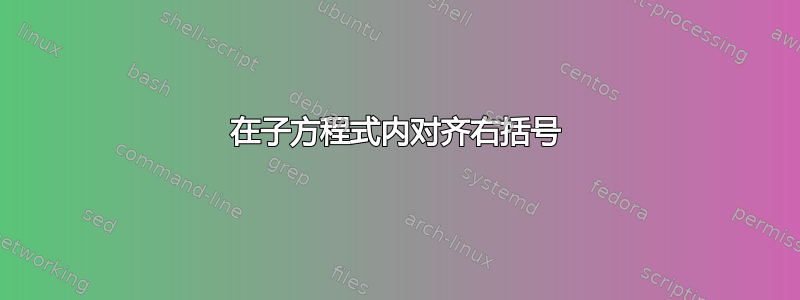
我正在尝试使用右括号来对齐一组方程式。
这里有一个类似的问题在右括号内对齐多个方程式
就我而言,我还想使用子方程来获得(1a)和(1b)。
到目前为止,我一直在使用 rcases,其代码类似于:
\documentclass{article}
\usepackage{mathtools}
\begin{document}
\begin{subequations}
\begin{align}
&\begin{rcases}
a &= b + c \\
d &= e + f + g \\
h &= i + j + k + l\\
\end{rcases}&& \quad\text{three equations}\\
& \begin{rcases}
m &= n \\
o &= p*q
\end{rcases}&& \quad\text{another two equations}
\end{align}
\end{subequations}
\end{document}
下图用红色标出了我想要的更改。
答案1
它也可以通过嵌套环境获得aligned,具有更好的符号间距= 。变体将修补rcases环境,结果相同:
\documentclass{article}
\usepackage{mathtools}
\makeatletter
\newcases{myrcases}{\thickspace}{%
$\m@th{##}$\hfil}{$\m@th{##}$\hfil}{.}{\rbrace}
\makeatother
\usepackage{eqparbox}
\newcommand{\eqmathboxR}[2][D]{\eqmakebox[#1][r]{$\displaystyle#2$}}
\newcommand{\eqmathboxL}[2][S]{\eqmakebox[#1][l]{$\displaystyle#2$}}
\begin{document}
\begin{subequations}
\begin{alignat}{2}
&\left.\begin{aligned}
\eqmathboxR{a} &= b + c \\
\eqmathboxR{d} &= e + f + g \\
\eqmathboxR{h}&= \eqmathboxL{i + j + k + l}
\end{aligned}\right\rbrace&\enspace &\text{three equations}\\[1ex]
& \left. \begin{aligned}
\eqmathboxR{\implies m} & = n \\
\eqmathboxR{o} & = \eqmathboxL{p*q}
\end{aligned}\right\rbrace&\enspace &\text{another two equations}
\end{alignat}
\end{subequations}
\end{document}
答案2
您可以通过将符号右侧的所有表达式放入=等宽的框中来伪对齐括号。
这个包eqparbox正是用于这个目的。
不幸的是,括号的不同印刷属性扰乱了外观。应该可以重新定义mathtools在环境中使用的括号命令rcases。

\documentclass{article}
\usepackage{mathtools}
\usepackage{eqparbox}
\newcommand\EqMathBox[2][x]{%
\eqparbox{#1}{$\displaystyle #2$}%
}
\begin{document}
\begin{subequations}
\begin{align}
%%%%%%%%%%%%%%%%%%%%%%%%%%%%%%%%%%%%%%%%%%%%%%%%
& \begin{rcases}
\EqMathBox[left]{a}& = \EqMathBox{b + c} \\
\EqMathBox[left]{d}& = \EqMathBox{e + f + g} \\
\EqMathBox[left]{h}& = \EqMathBox{i + j + k + l \qquad\quad} \\
\end{rcases}%
\quad\text{three equations} &&\\[1em]
%%%%%%%%%%%%%%%%%%%%%%%%%%%%%%%%%%%%%%%%%%%%%%%%
& \begin{rcases}
\EqMathBox[left]{m}& = \EqMathBox{n} \\
\EqMathBox[left]{o}& = \EqMathBox{p\cdot q} \\
\end{rcases}%
\quad\text{another two equations} &&
%%%%%%%%%%%%%%%%%%%%%%%%%%%%%%%%%%%%%%%%%%%%%%%%
\end{align}
\end{subequations}
\end{document}




